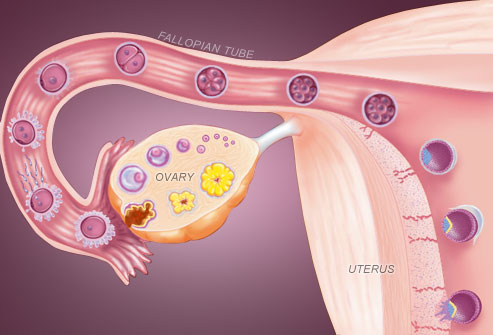Researchers in the field of psychoneuroimmunology (PNI) study the ways in which the immune system and the nervous system communicate with each other and impact people’s mental and emotional health. Even though the field is relatively new, many studies have been designed to examine the influence of immune and nervous systems on the psychological consequences of stress. In literal terms, recent studies have related stress to be psychological. Many have apportioned the causes of stress to the happenings or events around them, often neglecting the invisible obvious fact that stress is relatively linked to mental health in two important ways: Stress can cause mental health problems, and make existing problems worse. People are more aware of the visible sources of stress in their life such as money, time, traffic jam, and daily job schedules but never aware of the weird stress triggers. Professor of sociology Scott Schieman, at the University…
Things You Didn’t Know About Miscarriage
By: Shaelynn-Miller It’s hard to know what to say or do when someone you love experiences a miscarriage – it’s a touchy subject people don’t like to bring up. But amongst the awkward tension of not knowing how to react, there are things left unsaid that shouldn’t be. Here are seven things about miscarriage no one talks about (but should): It’s a lot more common than you think Between 10 and 25 percent of recognized pregnancies, end in miscarriage. In fact, most healthy women have a 20 percent chance of miscarrying. Just because it’s common doesn’t make it any easier to handle From the time a woman sees those two pink lines on a pregnancy test, she begins to dream of the little bundle of joy growing inside her and what life will be like once the child arrives. Having that stripped away so suddenly is devastating. Many women experience depression…
Cancer: Reducing Potential Risks from Cell Phone
The World Health Organization listed cell phones as one of the possible causes of brain cancer because of its high emission of radiation. This has raised much concern as cell phones have become very important to our daily activities. One of the sure ways to avoid the potential risk of cancer caused by cell phones is to reduce exposure to radiation. This can be done by employing the following steps: Get a low-radiation phone: Low radiation phones are safer to use because they emit less radiation. When buying a phone, EMF-Health.comrecommends that you consider the phone’s SAR (specific absorption rate), a way of measuring the radiation absorbed by the body. It’s usually listed in the phone’s instruction manual. Keep the phone away from your ear when you can: Wait for your calls to connect before bringing the phone to your ear, that way you reduce the amount of radiation absorbed…
Industrial Chemicals and the Impact on Female Reproductive Health
By: Dr. Firuza R.Parikh & Ms. Maherra Khambaty In today’s world, man-made chemicals have become a part of our daily lives. Exposure to environmental chemicals and metals – in the air, water, soil, food, and consumer products is omnipresent. The National Health and Nutrition Examination Survey from 2003-2004 stated that virtually every pregnant woman in the United States is exposed to at least 43 different chemicals. Scientific evidence suggests that numerous chemicals, both natural and man-made, interfere with the endocrine or hormonal system which adversely impacts on human health and reproduction. These chemicals are often referred to as Endocrine Disruptors or EDs. They are present in toys, plastic bottles, food packaging, pesticides, detergents, and fragrances. They are in the food we eat, and the air we breathe. Some EDs persist in the environment for decades without being broken down and they bio-accumulate through the food chain. So why are Endocrine…
Maximising a Woman’s Fertile Period
By: Dr. Abayomi Ajayi A woman has a so called fertile window or period when she is only able to naturally conceive in her month long menstrual cycle. This is how it works in humans. Every month a woman’s menstrual cycle begins with bleeding which is generally referred to as menses. It is the shedding of the thickened lining of the womb. This thickening had occurred in the previous menstrual cycle under the influence of hormones or chemical substances from the brain and ovaries to prepare to receive a pregnancy. In fact, some refer to menses as the tears of a disappointed womb. Despite this disappointment, the womb picks itself up again and starts to prepare in the hope that this time a pregnancy will occur. This preparation commences with the bleeding and another rise in production of these chemical substances (hormones) from the brain and ovaries. At the same…
Living Beyond Aging Wrinkles
Aging wrinkles can be so disturbing, you look in the mirror and see the first signs of fine lines and wrinkles. They’re around your eyes, your mouth, your forehead—and they’re starting to set in. Most times you try to ignore these changes—but all of a sudden, they become more pronounced. According to Paula’s choice skincare, the sun can be a great influencer of wrinkles. Your skin color can make you more vulnerable to serious sun damage when you aren’t wearing sunscreen. However, regardless of your skin color, unprotected sun exposure is still putting your skin at risk. Depending on how much unprotected sun exposure you’ve had, fine lines and wrinkles can start showing up as early as your mid-twenties! A sunscreen rated SPF 30 or greater applied on a daily basis is one sure way to reduce the risk of early signs of aging. The Harvard medical school has proven…
MENOPAUSE
Menopause which is also known as climacteric is a normal health condition that all women experience when they get to a certain age, although the ages differ. The term “menopause” can describe any of the changes a woman goes through either just before or after she stops menstruating, marking the end of her reproductive period. At this time, menstrual flow stops completely and the woman is unable to bear children. Menopause typically occurs between 49 and 52 years of age. What Causes Menopause? Every woman is born with a finite number of eggs, which are stored in the ovaries. The ovaries also produce the hormones estrogen and progesterone, which is responsible for the monthly menstruation and ovulation. Menopause happens when the ovaries stop releasing eggs monthly in form of blood (menstruation). Menopause is said to be normal when it occurs after the age of 40 but abnormal when it happens before age 40. Early menopause can occur…







